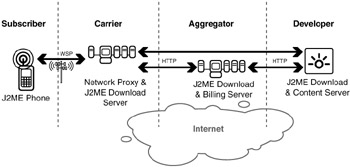Java 2 Micro Edition
In the Java 2 Micro Edition (J2ME) model, an application is stored and executed locally on the mobile phone. Network access is not required, although the application can optionally retrieve data from the Internet if it has been designed to do so. The application can support graphics, animation, local data storage, network access, and extensive program logic. Therefore, J2ME is a highly appealing technology for game developers.
The economic advantage of J2ME is that it supports a product-based billing model that is familiar to every consumer. Just like buying software for a personal computer, the consumer pays a fee for the software, installs it on the mobile phone, and then executes it as desired. Of course, other billing options, such as subscription-based fees, can be used depending on the functionality of the billing system in place. However, since J2ME is fundamentally a product-based model, it is easier to sell to the consumer than SMS or WAP services.
J2ME Technology
Although Sun has standardized the J2ME Mobile Information Device Profile (MIDP) APIs, the handsets are highly varied in their screen, memory, and performance capabilities. Even mobile phones built by the same manufacturer for the same carrier are highly varied in their capabilities. From a business perspective, the developer should support as many devices as possible in order to realize greater market penetration. However, more sophisticated handsets should not suffer from the "lowest common denominator" syndrome for the sake of supporting low-end devices. This dilemma is left to the developers to resolve.
Figure 2.6.4 illustrates the J2ME technology model. The carrier typically provides a mechanism for subscribers to download J2ME applications over the air. The carrier also provides a mechanism, via the same or different server, for the applications to access Internet content servers. An aggregator can facilitate the distribution and billing of applications and content on behalf of the developer.

Figure 2.6.4: J2ME connectivity options.
Case Study 2.6.3: WirelessDeveloper
WirelessDeveloper serves the Wireless industry with a number of unique services. Through their Developer Program Management service, they help large companies establish and manage relationships with wireless software developers. Developer Programs allow wireless carriers and platform providers to offer their customers many more wireless applications than they could develop on their own, and provides new channels to market for developers.
WirelessDeveloper also provides an Agent service to wireless software developers who are looking for a mechanism for generating revenue based on their applications. They will act as an Agent for wireless game and other wireless application developers. In this role, they assist developers with marketing and direct sales for their applications throughout the world. WirelessDeveloper complements this by coaching the application developer on how to capitalize on their strengths.
WirelessDeveloper provides a PartnerMatch service. This service provides potential clients and strategic partners to wireless software developers. Since making the appropriate wireless contacts are often difficult and time consuming to obtain, this can be a cost-effective mechanism for wireless application developers seeking clients or wireless partners. The wireless software developer specifies the type of contacts that they would like to obtain, and WirelessDeveloper in turn facilitates these.
Finally, technical staff can use the WirelessDeveloper training services as a resource to become familiar and certified with WAP, GPRS, J2ME, CDPD, and other wireless technologies, and build a unique online r sum to promote their capabilities on the Web.
Special WirelessDeveloper tip: Taking your wireless games to market and deriving revenue from them is often called "monetizing your application." Ensure that you have a method for billing gameplay in a variety of ways when you design the game.
Information on WirelessDeveloper can be obtained by contacting Susan Leuth at <Susan@WirelessDeveloper.com> or by referencing www.wirelessdeveloper.com.
J2ME Sales Models
The decision to sell through the carrier will be driven largely by the carrier's role in the application distribution model. It will be necessary to pursue this model if applications can only be sold through the carrier. A carrier will typically take this position in order to guarantee application quality, protect its wireless network, and provide a consistent experience to the subscriber. The carrier must approve the application concept, might require application certification, and finally make the application available to its subscriber base. The advantage to the developer is that this model provides a simple subscriber marketing, sales, and distribution mechanism. The disadvantage to the developer is that the process can take several months and the developer might have to pay for certification. Considering that the typical price for a J2ME application is less than $10, it can take a while to recoup the initial expenses.
J2ME Aggregators
Aggregators can help developers to place J2ME applications with the carriers and directly with consumers. Some aggregators provide their own certification process and will market games and other applications to carriers. These aggregators provide an alternative path to placing applications with carriers that only allow subscribers access to authorized J2ME software.
Other aggregators sell applications directly to consumers. These companies provide a single directory of applications providing consumers with a "one-stop shop" for J2ME applications. The advantage is that these companies can provide billing services.
Direct J2ME Sales
Finally, the application developer can elect to sell J2ME applications directly to the consumer. The advantage to this approach is that the developer can retain all revenues. The disadvantage is that the developer must provide all marketing, sales, and distribution services such as billing.
In conclusion, J2ME technology is expected to have great consumer appeal and offers many technical and business advantages over SMS and WAP. Distribution models will initially be varied, but ultimately consumer demand will drive the market.
EAN: 2147483647
Pages: 275